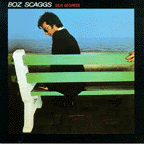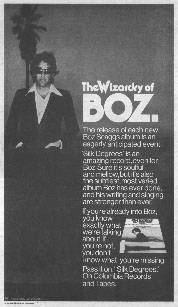![]()
  |

Silk Degrees
Boz Scaggs
Columbia 33920
Released: February 1976
Chart Peak: #2
Weeks Charted: 115
Certified 4x Platinum: 10/26/84
 Last year's Slow Dancer, like his classic first album, suggested that Boz Scaggs might break out of his San Francisco Bay Area cult to a larger national following. Dancer wasn't a radical departure from his earlier recordings, but for the first time Scaggs played no instrument, concentrating instead on singing.
Last year's Slow Dancer, like his classic first album, suggested that Boz Scaggs might break out of his San Francisco Bay Area cult to a larger national following. Dancer wasn't a radical departure from his earlier recordings, but for the first time Scaggs played no instrument, concentrating instead on singing.
Joe Wissert has replaced Johnny Bristol as producer, but Silk Degrees, although blander, is similar in style to its predecessor. "Georgia," a smoky ballad, lets Boz soar into the Fifties harmony he's recently discovered; his beautiful voice could easily hold its own on any street corner in New York. But "Jump Street" points up the dilemma in the decision not to play guitar on record. While similar in form to "Dime a Dance Romance," from his Steve Miller days, it lacks drive and focus: where "Romance" was propelled by Scagg's singing and playing, "Jump Street" just meanders without an instrumental counterpoint to Boz's singing. It probably isn't the session players' fault; Scaggs simply doesn't feel comfortable when singing rock & roll without his guitar.
 Click image for larger view. |
Bonus Reviews!
Boz Scaggs is a talented vocalist. He knows jazz phrasing, and at his best he can create a sense of intimacy with the listener. At his least he can be ingratiating. But there's always something missing from his performances. He is skillful but unemotional, a fair actor rather than a singer. After hearing three Scaggs albums I'm not looking forward to a fourth. The present effort suffers from weak songwriting (his) and noisy, burdensome arrangements. Worst of all, he mauls a fine, delicate Allen Toussaint tune, "What Do You Want the Girl to Do," by taking it at a pepped-up tempo.
Scaggs' admirers consider him "special." I find him clever rather than special, and I've always had the sneaking suspicion that he's trying to pull a fast one, to convince the listener that his performances have an artistic merit they don't in fact possess. Remember what Andy said to the Kingfish: "You always bamboozlin' me. Well, I am here to tell you that you have bammed your last boozle."
- Joel Vance, Stereo Review, 7/76.
A mixed bag of material, and it's all well handled by Scaggs, backup singers and band. AM and FM will each have their pick of cuts. Black radio might even jump on the bandwagon with a cut like "What Can I Say." The writing/arranging team of Scaggs and David Paich score throughout. Expect Scagg's followers to be pleased, while the uninitiated get turned on. Best cuts: "Georgia," "Harbor Lights," "What Can I Say," "It's Over," "Love Me Tomorrow."
- Billboard, 1976.
Scaggs is criticized for his detachment, but I say it's subtlety and I say thank god for it. In the past, he's sometimes bought (not to mention sold) his own lushness, but this collection is cooled by droll undercurrents -- white soul with a sense of humor that isn't consumed in self-parody. Inspirational Verse: "Gotta have a jones for this/Jones for that/This runnin' with the joneses, boy/Just ain't where it's at." A-
- Robert Christgau, Christgau's Record Guide, 1981.
Still the best available example of Boz's cool, smooth white soul sound -- one of the better Bay-Area lackluster-seventies sounds. Lush, sophisticated pop performed with detached professionalism, it still manages to evoke genuine feeling. The ballads are meant for firelit midnights, the uptempo numbers for ballroom dance floors, and all fit comfortably into their intended niches. The whole affair has a sort of deco elegance about it, but it never displays affectation. It's hard to imagine anyone resisting the pleasures of "Georgia," "Lido Shuffle," or "We're All Alone." The CBS disc sounds compressed, afflicted by a mudiness in the instrumentation. Mobile Fidelity's gold ultradisc is a marked sonic improvement, much more open and dynamic, but with a tendency to bury the lead vocal. A-
- Bill Shapiro, Rock & Roll Review: A Guide to Good Rock on CD, 1991.
Scaggs reached his commercial peak with this elegant collection of soulful urban pop, thanks to hits like the ultra-smooth disco of "Lowdown" (number three), the revved-up "Lido Shuffle" (number 11), and "We're All Alone," Scagg's finest ballad. * * * *
- Rick Clark, The All-Music Guide to Rock, 1995.
Further reading on Super Seventies RockSite!: |
- Allan Orski, Musichound Rock: The Essential Album Guide, 1996.
In 1976 you could walk across any college campus and hear this alternative for white kids who wanted to be funky without diving into disco, but the champagne-rock jewel has outlived its time with "Lowdown"'s rep as a rap sample fave. Every song is good on a slick, sophisticated pop album that paid the bills for Boz. His distinctive voice and jazzy grooves on cuts like "Lido Shuffle" still sound smooth on summer evenings -- what a cool dude! * * * * *
- Zagat Survey Music Guide - 1,000 Top Albums of All Time, 2003.
As an R&B singer, inclining more to pop and rock, the mid-1970s saw Boz Scaggs take the commercially and artistically crucial decision to quit working with producer Johnny Bristol and team up with Columbia staff producer Joe Wissert, who had been working the magic for Earth, Wind and Fire.
Assembling a studio band including bassist David Hungate, drummer Jeff Porcaro and keyboard player and arranger David Paich (later to form the foundation of Toto), the results captured the FM airwaves. Silk Degrees reached Number Two in the US and 20 in the UK. "Lowdown" was a Top Three single, and "Lido Shuffle," "It's Over" and "What Can I Say" all made solid chart showings. Another standout track, the Scaggs-penned "We're All Alone," was later a Top 10 hit for Rita Coolidge.
Scaggs now inhabited a world far away from the futuristic work he had produced as a member of Steve Miller's band in the late 1960s. "Lide Shuffle" was a synthesizer and horn-powered romp, while the more considered "Lowdown" picked up a Grammy for best rhythm and blues song. With Silk Degrees Scaggs finally had the right songs, the right setting and the right suit, the album stayed in the charts for more than 100 weeks and earned platinum status, although he was never able to repeat its success.
As of 2004, Silk Degrees was the #43 best-selling album of the 70s.
- Hamish Champ, The 100 Best-Selling Albums of the 70s, 2004.
![]() Reader's Comments
Reader's Comments
No comments so far, be the first to comment.
